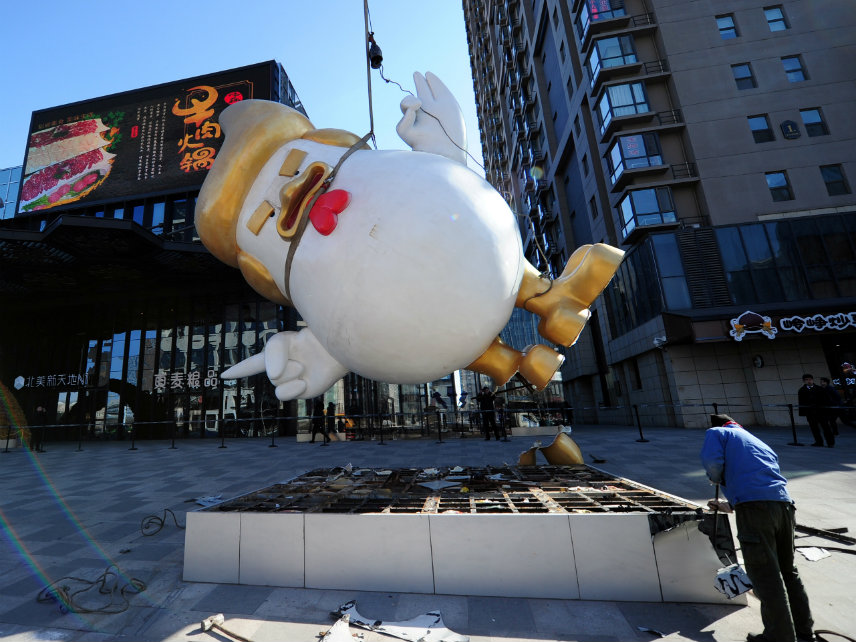Trump's Steel Tariffs Will Help, Not Hurt, China
The proposed tariffs are an exercise in ego, not economics.

President Donald Trump apparently believes that "trade wars are good, and easy to win."
They are neither. And, in fact, Trump's plan to slap a 25 percent tariff on all steel imports—something the president is considering as a way to help American steel manufacturers by protecting them from international competition—might indirectly boost China's steel industry while punishing some of America's top allies and trading partners, along with the very American workers the president supposedly wants to help. If the tariffs trigger a trade war, something analysts say could happen, then China probably stands to gain further.
Trump loves to talk about how China has been "killing" U.S. manufacturing, and to blame China for dumping cheap steel into the American market. In reality, the U.S. imported $976 million worth of steel from China in 2017 (up from $906 million the year before), which means China accounted for barely more than 3 percent of all steel imports.
The United States imported far more steel from places like Japan ($1.65 billion), Brazil ($2.44 billion), and South Korea ($2.78 billion) last year. The largest exporter of steel to the United States is Canada, which sent more than 5.6 million metric tons of the stuff worth more than $5.1 billion across the border during 2017.
The new tariffs will be applied to all steel imports, which means close allies like Japan, Korea, and Canada will be hurt by the tariffs more than Trump's favored enemy of China.
"Hitting China and Canada with the same tariff doesn't penalize China relative to anyone else," says Dan Ikenson, director of the Center for Trade Policy Studies at the Cato Institute, a libertarian think tank. "That doesn't, and shouldn't, sit well with exporters from countries that have done nothing wrong."
Think about it like this. Trump's tariff will build a protectionist wall around American steel manufacturers, but it won't entirely stop the flow of foreign steel into the country. Because the wall will be the same height for all imports, the cheaper Chinese steel that Trump likes to vilify will still have an advantage over all other sources.
Meanwhile, American businesses that rely on steel imports will have to pay higher prices, which will be passed along to consumers. All steel-made products will be more expensive if the tariffs are imposed—and the same is true for aluminum products if Trump follows through with his threat to impose a 10 percent tariff on them. That's part of the reason why the stock market dropped 420 points immediately after Trump's surprise announcement of the tariff proposal last week. As Matt Welch explained on Friday, Barack Obama's tariffs on Chinese tires cost American consumers an estimated $1.1 billion in return for preserving 1,200 jobs in the domestic tire industry, while George W. Bush's duties on foreign steel destroyed some 200,000 jobs in other sectors, exceeding the total employment of the American steel industry.
Michael Froman, former United States trade representative during the Obama administration, tells Vox that there's little doubt China is engaged in some unfair trading when it comes to steel and aluminum. The problem, though, is that Trump's tariff proposal "does very little, if anything, to affect China."
"Instead, we're hitting our closest allies and partners with a set of tariffs under the justification of national security," he says.
Those same concerns are causing some Republicans in Congress to challenge the president's proposal. On Sunday, Sen. Lindsey Graham (R-S.C.) said "China wins" if tariffs increase prices for American consumers or create conflict between the United States and its major trading partners.
"You're punishing the American consumer and our allies. You're making a huge mistake," Graham said on CBS' Face The Nation. "Go after China—not the rest of the world."
That's really just the start. China could respond to the Trump tariffs by imposing their own import taxes on American-made products like soy beans, airplanes, or computer technology. If China doesn't respond directly, other countries might. A trade war that draws new protectionist tariffs from the European Union aimed at American exports would harm both trading partners, and indirectly boost China.
Already, European Commission President Jean-Claude Junker has promised to "not sit idly while our industry is hit with unfair measures that put thousands of European jobs at risk," and Chrystia Freeland, Canada's foreign minister, has threatened to take "responsive measures to defend its trade interests and workers."
If the trade war escalates to the extend that current trade agreements are jeopardized, it could drive a wedge between the United States and it's major allies. In that environment, Ikenson warns, China could get away with more rule violations due to the lack of "a coherent, unified response."
In other words, Trump's tariffs and the trade wars they could initiate might indeed be "good and easy to win," but not for the United States.


Show Comments (96)